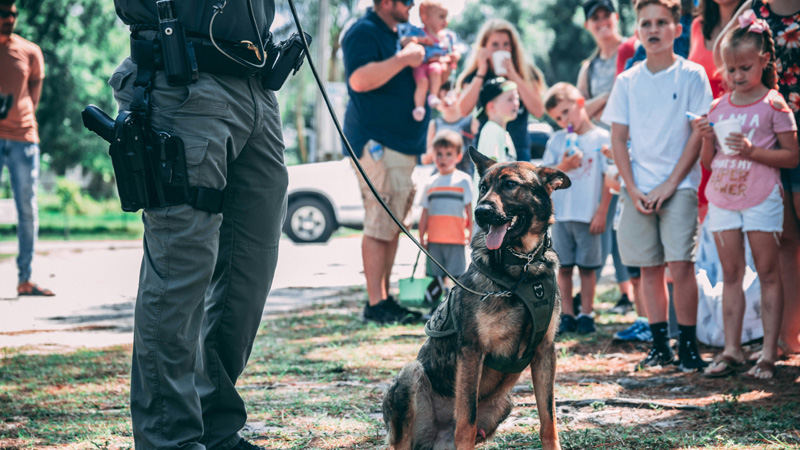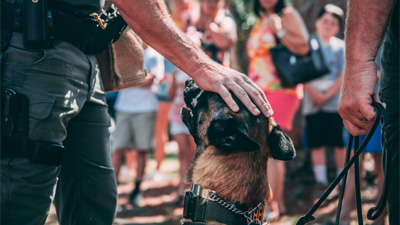- Size
- Smallest
- Small
- Small to Medium
- Medium
- Large
- Giant
- Characteristics
- Smartest
- Hypoallergenic
- Fluffy
- Best Guard
- Best Family
- Best for Kids
- Low Shedding
- Healthiest
- Police Dogs
- Most Calm
- Quietest
- Color
- White
- Black
- Grey
- Brown
- Blue
- Red
- Coat
- Hairless
- Short
- Long
- Origin
- Japan
- China
- Australia
- Germany
- Italy
- United States
- France
- Group
- Hound
- Terrier
- Herding
- Toy
- Working
- Sporting
Do Retired Police Dogs Make Good Pets?

Photo by Jason Jarrach on Unsplash
Dogs have been cherished companions to humans for centuries, offering loyalty, companionship, and a myriad of other qualities that make them an integral part of our lives. While many people prefer puppies as their furry friends, there is a growing interest in adopting retired police dogs. These canine heroes have spent their lives in service, often working alongside law enforcement officers to protect communities and uphold the law. The question arises: do retired police dogs make good pets?
In this article, we'll explore the unique qualities of retired police dogs, the challenges they may present, and the rewards they can offer to those willing to open their homes to these devoted animals.
The Background of Retired Police Dogs
Retired police dogs are typically German Shepherds, Belgian Malinois, or Dutch Shepherds, breeds known for their intelligence, loyalty, and strong work ethic. These qualities make them well-suited for police work, where tasks range from narcotics detection to search and rescue operations. The life of a police dog involves rigorous training, exposure to various environments, and the development of specialized skills. Once a police dog reaches retirement age, usually around 8 to 10 years old, they may be eligible for adoption by civilians.
Qualities of Retired Police Dogs as Pets
1. Disciplined Temperament:
Retired police dogs have undergone rigorous training and have been carefully selected for their stable and disciplined temperaments. This makes them well-suited to adapt to home life and become loyal and obedient companions.
2. Strong Bonding Ability:
These canines often have a remarkable ability to form strong bonds with their human handlers. When retired, they maintain their loyalty and transfer their devotion to their new families, making them highly affectionate and protective pets.
3. Intelligent and Trainable:
Having received extensive training during their working years, retired police dogs have high levels of intelligence and are typically highly trainable. They quickly grasp commands and are adaptable to learning new skills or commands as household pets.
4. Increased Socialization:
Retired police dogs have been exposed to various social situations during their active duty, which helps them become well-socialized pets. They are typically comfortable with different environments, other animals, and people.
5. Energy Level:
While retired police dogs may have experienced a decrease in their energy levels due to age or previous injuries, they still require regular exercise and mental stimulation. Adequate physical activity and mental challenges are essential for maintaining their overall well-being.
Considerations for Adopting a Retired Police Dog
Experienced Owner:
Retired police dogs are best suited for experienced dog owners who have knowledge of working breeds and their specific requirements. Understanding how to provide proper training, exercise, and mental stimulation is crucial to their successful integration into a home environment.
Adjustment Period:
It's important to recognize that retired police dogs may experience an adjustment period when transitioning into domestic life. Patience, understanding, and providing consistent routines and boundaries will help facilitate a smooth and successful transition.
Health Concerns:
Like all breeds, retired police dogs may have specific health concerns associated with their breed or their previous working duties. Physical conditions such as joint problems or minor injuries may require ongoing management and veterinary care.
Retirement Benefits:
When adopting a retired police dog, consider that many agencies have programs in place to support the medical expenses and care of these dogs during their retirement years. Gathering information about available benefits can be beneficial when considering taking on this responsibility.
Dedicated Time and Attention:
Retired police dogs have been accustomed to structured routines and plenty of mental and physical stimulation. Ensure you can devote sufficient time and attention to meet their needs, including regular exercise, training, and mental enrichment activities.
Conclusion
In conclusion, retired police dogs can indeed make excellent pets for the right adopter. While they may present certain challenges, such as an adjustment period and potential health issues, the rewards far outweigh the drawbacks. Their unique qualities, disciplined nature, and loyal disposition make them well-suited for families willing to invest time and effort into their care.
Adopting a retired police dog not only provides a loving home for these deserving animals but also offers a chance to honor their service and continue their legacy in a civilian setting. If you're considering adding a furry family member to your home, exploring the possibility of adopting a retired police dog could be a rewarding and meaningful choice.
You May Also Like
 Dog BreedsWhat Happens To A Retired Police Dog?
Dog BreedsWhat Happens To A Retired Police Dog? Dog BreedsWhy Are Police Dogs Called K-9?
Dog BreedsWhy Are Police Dogs Called K-9? Dog BreedsBreed Guide: Choosing the Best Service Dog Breeds
Dog BreedsBreed Guide: Choosing the Best Service Dog Breeds Dog AttacksWhen Dogs Attack: Holding Pet Owners Accountable for Personal Injuries
Dog AttacksWhen Dogs Attack: Holding Pet Owners Accountable for Personal Injuries German Dog Breeds10 German Dog Breeds That Are Popular Throughout the World
German Dog Breeds10 German Dog Breeds That Are Popular Throughout the World Breed Reviews5 Different Types of German Shepherds : Which One Is Best?
Breed Reviews5 Different Types of German Shepherds : Which One Is Best?